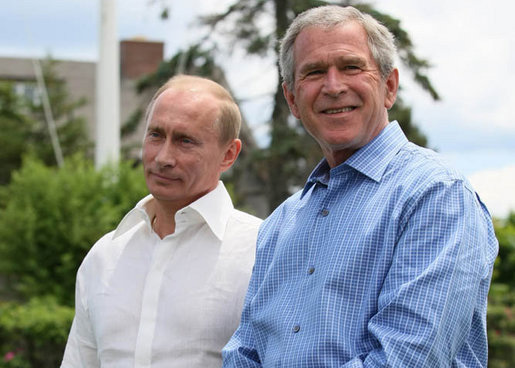A do třetice téma George W. Bush a nová kniha od Petera Bakera Days of Fire (předtím zde a zde). Sám autor pro Foreign Policy připravil výcuc ze své nové knihy ohledně vztahu mezi Bushem a Putinem. Baker totiž působil nejen jako "White House corespondent" pro WashPost a NYTimes, ale v mezidobí působil čtyři roky jako zpravodaj v Moskvě, kde se zabýval Putinem, válkou v Čečensku atd. a o celé anabázi napsal knihu Kremlin Rising: Vladimir Putin’s Russia and the End of Revolution.
Mimochodem, Bakerova manželka byla ve vedení WashPost, ale poté, co se s ní nepěkně zacházelo, Glazer odešel do konkurenčních NYTimes. Mocenské boje na všech úrovních...
Ale zpět k Days of Fire. Bakerův článek ve Foreign Policy je plný citací, vzpomínek a zajímavých postřehů.
- Obama's own dashed aspirations to build a new partnership with Moscow seem to echo his predecessor's experience. Bush thought he could forge more meaningful ties with Russia in his early years, ... eventually coming into overt diplomatic conflict during the Georgia war of 2008. Obama likewise came into office intent on pushing the "reset" button and similarly saw early progress with a nuclear arms treaty ... only to find his efforts increasingly thwarted by the same Putinist revanchism.
- Every time Cheney saw Putin, he privately told people, "I think KGB, KGB, KGB." :-D
- Bush would attribute Putin's demands or paranoia to those around him, ... Putin in a private conversation with Bush asserted that Americans deliberately sent bad poultry to Russia. "I know you have separate plants for chickens for America and chickens for Russia," Putin told Bush. Bush was astonished. "Vladimir, you're wrong." "My people have told me this is true," Putin insisted.
- Bush could hardly have missed the fact that it was the Russian president who fought him publicly and powerfully on the Iraq War, joining his counterparts in Paris and Berlin. Even then, Bush was forbearing, intent on preventing a broader rupture in the relationship. Rice at the time privately summed up the policy this way: "Punish France, ignore Germany and forgive Russia."
- Bush was astonished that Putin had tried to influence him by offering to hire a close friend of the president's and he found Putin's understanding of the world disconnected from reality. "He's not well informed," Bush groused. "It's like arguing with an eighth grader with his facts wrong."
- Bush had been trying to get Putin to relax his authoritarian rule to no avail. "I think Putin is not a democrat anymore," Bush lamented a few weeks later to another visitor, the prime minister of Slovenia. "He's a tsar. I think we've lost him."
- Rice flew to Paris, Moscow, and Tbilisi to broker a new agreement. Russia agreed to pull out of Georgia but not from its breakaway republics. The war was over, but the relationship between Bush and Putin that started with soul-gazing seven years earlier was irrevocably broken.
Foto: Wiki











2 komentáře:
Jaký myslíš, že je podíl fiction a non-fiction?
Těžko říct. :)
Okomentovat